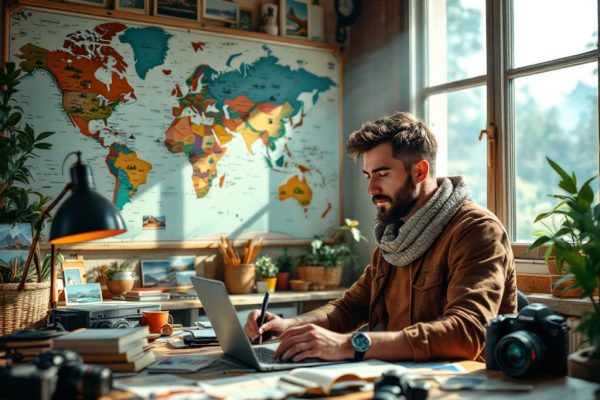Fun Facts about Travel Journalism
Ever dreamt of a career exploring exotic locales and sharing captivating stories? Travel journalism offers this and more, blending adventure with the power of storytelling. From uncovering hidden gems through meticulous research to championing sustainable tourism, discover the exciting world of travel journalism. Explore the essential skills, the challenges, and the evolving digital landscape that shapes this dynamic field. Embark on a journey to learn how you can transform your passion for travel into a rewarding career.
Important information

- Travel journalism combines storytelling and exploration, focusing on diverse cultures and responsible tourism.
- Key skills for travel journalists include adaptability, strong writing, thorough research, networking, and multimedia storytelling.
- Challenges include burnout from constant travel, financial instability (especially for freelancers), maintaining credibility, and intense competition.
- Sustainable tourism is a key focus, requiring journalists to promote eco-friendly practices and raise awareness of environmental issues.
- The digital age transformed the field, with SEO and multimedia storytelling (videos, photos, audio) becoming essential for success.
Fun Facts about Travel Journalism
Travel journalism blends storytelling with the thrill of exploration, offering captivating glimpses into diverse cultures and far-off lands. Travel journalists embark on unique adventures, from trekking remote trails to savoring exotic cuisines. Adaptability is key, as unexpected events and itinerary changes are common. Many renowned travel writers began their careers in other fields, enriching their narratives with diverse perspectives. Travel journalism also champions sustainable tourism by highlighting responsible travel practices and local initiatives, such as eco-friendly accommodations and community-based tours. Centuries ago, explorers like Marco Polo and Ibn Battuta ignited wanderlust and fostered cultural appreciation through their early travelogues. The digital age revolutionized the field, enabling travel journalists to share real-time experiences through blogs and social media. This shift broadened perspectives and made travel writing more accessible, while also presenting new challenges, particularly the increased importance of maintaining accuracy and credibility.
Essential Skills for Travel Journalists
A successful travel journalist needs a diverse skillset. Adaptability is essential for navigating unfamiliar situations and cultures with sensitivity. Strong writing skills are crucial for painting vivid pictures and bringing destinations to life. Thorough research ensures accurate information about destinations and local customs. Journalists must deeply understand the places they write about. Networking and building relationships with local contacts provide valuable insights that enrich their stories. Photography and multimedia storytelling add another layer of depth. Visuals, such as images and videos, enhance written narratives and further immerse readers in the experience. A successful travel journalist blends adaptability, thorough research, strong communication, and multimedia skills to capture and share the essence of each journey with the world. Here are the key skills needed:
- Adaptability: navigating unfamiliar situations and cultures with sensitivity.
- Strong writing skills: painting vivid pictures and bringing destinations to life.
- Thorough research: ensuring accurate information about destinations and local customs.
- Networking: building relationships with local contacts to gain valuable insights.
- Photography and multimedia storytelling: adding depth with visuals like images and videos.
Research and Adaptability
Thorough research ensures factual accuracy and reveals compelling narratives. Journalists must be adaptable, as unforeseen issues like flight cancellations or cultural misunderstandings can arise. Both research and adaptability are essential for crafting believable and engaging stories.
Communication and Independence
Travel journalists need a unique blend of skills to thrive. Strong communication is essential for interacting with diverse people, from local residents to tourism professionals. Resourcefulness and adaptability are key, as they often work independently in unfamiliar locations. This solo work allows them to discover unique stories and offer fresh perspectives. Finally, excellent writing skills are crucial for creating compelling narratives that resonate with audiences across different media platforms.
Descriptive Writing and Attention to Detail
Travel journalists, with their keen eye for detail, use descriptive language to transport you to far-off destinations. Their words paint vivid pictures, capturing the essence of a place and making you feel like you’re part of the adventure.
The Reality Behind the Glamour
Travel journalism is a demanding field that requires more than a passion for exploration. Journalists in this field face constant pressure to produce engaging content within strict deadlines, demanding meticulous research, impeccable organizational skills, and adaptability to unforeseen circumstances. Crafting compelling narratives and capturing stunning visuals requires significant time, intense focus, and often long hours. While the rewards can be great, success in travel journalism requires dedication, resilience, and a willingness to overcome inherent challenges.
The Challenges of Travel Journalism
Travel journalism, while exciting, presents unique challenges. The constant travel can lead to burnout, impacting both physical and mental well-being. Constantly adapting to new environments takes a toll. Finances are another hurdle, particularly for freelancers who struggle to secure consistent work while managing expenses like travel, accommodation, and equipment. Maintaining credibility is paramount, requiring diligent fact-checking and sourcing. Verifying information, especially in unfamiliar territories with limited resources, demands significant time and effort. Furthermore, the field is highly competitive, forcing journalists to embrace new technologies and storytelling approaches, including photography, videography, and social media, to remain relevant.
Challenges of Travel Journalism
Travel journalism, while a thrilling career, presents unique obstacles for those who pursue it.
- Burnout: Constant travel and adapting to new environments can negatively impact physical and mental well-being.
- Financial instability: Securing consistent work and managing travel, accommodation, and equipment expenses are significant hurdles, especially for freelancers.
Further Challenges
- Credibility maintenance: Diligent fact-checking and sourcing are crucial, especially in unfamiliar territories with limited resources.
- Competition: The field is highly competitive, requiring journalists to constantly adapt to new technologies and storytelling methods.
Burnout from Constant Traveling
Travel journalists, often facing demanding schedules, can experience burnout, disrupted sleep, and broken routines, ultimately impacting productivity. To combat this, prioritize rest, a healthy diet, and mindfulness techniques. Setting boundaries between professional and personal life is crucial for well-being. Regular exercise helps alleviate physical strain from constant travel and improves overall health. Prioritizing well-being ensures journalists stay healthy and productive while traveling. Here’s how to maintain well-being amid a demanding travel schedule:
Prioritize Rest: Ensure adequate sleep to combat exhaustion and maintain focus.
Maintain a Healthy Diet: Proper nutrition fuels the body and mind, supporting energy levels and overall health.
Practice Mindfulness: Incorporate mindfulness techniques to manage stress and improve mental well-being.
Set Boundaries: Establish clear boundaries between work and personal life to prevent burnout and maintain a healthy balance.
Exercise Regularly: Regular physical activity alleviates the strain of travel, boosts energy, and improves overall physical health.
Financial Responsibilities for Freelancers
Freelance travel journalists manage all their finances, from healthcare and retirement to taxes. Their income can fluctuate, so careful budgeting and financial planning are crucial. They must cover all expenses themselves, including travel, equipment, and professional development. For those considering this career path, understanding the financial implications is essential for long-term success. Here’s a breakdown of key financial aspects:
Income Management
Income for freelance travel journalists can vary significantly. Project-based payments, article fees, and other sources contribute to earnings. Tracking income and expenses meticulously is crucial for budgeting and tax purposes. Creating a separate business bank account can simplify financial management. Diversifying income streams can also help stabilize earnings. Consider additional services like photography, copywriting, or social media management.
Expense Management
Freelancers are responsible for all business-related expenses. These commonly include travel costs (flights, accommodation, transportation), equipment (cameras, laptops, software), and professional development (conferences, workshops, training). Accurate expense tracking is essential for tax deductions and profitability analysis. Consider using accounting software or apps to streamline this process.
Healthcare and Retirement
Healthcare and retirement planning require proactive management. Since traditional employer-sponsored plans are not available, freelancers must secure their own health insurance. Researching different options and understanding costs is essential. Similarly, retirement savings must be self-funded. Explore options like individual retirement accounts (IRAs) or other investment plans to secure your financial future.
Taxes
Freelancers are responsible for managing their own taxes. This includes income tax, self-employment tax, and potentially other local or state taxes. Setting aside a portion of each payment for taxes is crucial to avoid unexpected tax bills. Consulting with a tax advisor specializing in freelance or small business taxes can provide valuable guidance and ensure compliance.
Fact-checking and Reliable Sources
Accuracy is crucial for travel journalists. Building reader trust requires confirming details with reliable sources, ensuring both precision and credibility. While finding these sources can be challenging, cross-referencing information is essential for double-checking every detail.
The Importance of Research in Travel Journalism
Solid research is the cornerstone of impactful travel journalism, allowing writers to delve deeper than superficial observations and provide readers with authentic, insightful stories. By thoroughly researching a destination, journalists uncover hidden gems, local perspectives, and unique narratives, enriching their writing with cultural depth. This elevates travel journalism beyond mere trip recounts, transforming it into a valuable source of cultural understanding and inspiration. Through meticulous research, journalists vividly portray a destination’s history, traditions, and the very essence of its people.
Travel Journalism and Environmental Awareness
Travel journalism significantly influences local communities and their surrounding environments. Therefore, travel journalists must prioritize environmental awareness and promote sustainable tourism. Highlighting eco-friendly destinations and offering practical tips for responsible travel can make a real difference. Raising awareness about over-tourism and climate change is also crucial. Showcasing positive examples of sustainable tourism can inspire travelers to make more conscious choices. Ethical reporting and cultural sensitivity are equally important. Respecting local traditions and minimizing negative impacts through journalistic work is vital. Educating travelers about preserving cultural heritage is another key role. By promoting sustainable practices, travel journalism helps safeguard our environment and diverse cultures for future generations.
Responsibilities of a Sustainable Travel Journalist
- promote eco-friendly destinations,
- offer practical tips for responsible travel,
- raise awareness about over-tourism and climate change,
- showcase positive examples of sustainable tourism.
Further Responsibilities
- practice ethical reporting and cultural sensitivity,
- respect local traditions,
- minimize negative impacts,
- educate travelers about preserving cultural heritage.
The Role of Sustainable Tourism
Travel journalism plays a vital role in promoting sustainable tourism by highlighting eco-friendly practices and encouraging responsible travel. It emphasizes preserving local cultures and protecting environments. By raising awareness of critical issues like over-tourism and climate change, journalists empower travelers to make informed decisions. Showcasing positive examples further inspires change, motivating others to adopt similar sustainable practices. Travel journalism contributes significantly to a more responsible and sustainable travel industry.
Ethical Reporting and Cultural Sensitivity
Travel journalists have a responsibility to accurately portray cultures and communities, respecting local customs and traditions. This prevents harmful stereotypes and misrepresentations, building valuable trust with both readers and locals. Thoughtful travel writing further enriches the travel experience, making it more meaningful for everyone involved.
The Future of Travel Journalism
Digital transformation is revolutionizing travel journalism, making SEO essential for reaching wider audiences. Travel writers must now optimize content with meticulous keyword research. This digital shift requires adapting writing styles and strategies for online platforms.
The Power of Multimedia
The future of travel journalism is multimedia, immersing audiences with photos, videos, and audio. Captivating visuals and sounds are key to engaging storytelling.
- Platforms like Instagram, YouTube, and podcasts offer exciting new ways to share travel experiences,
- Drones and 360° cameras enhance storytelling with truly immersive perspectives.
Engaging the Senses
Multimedia content allows audiences to experience destinations through sight, sound, and even motion. This immersive approach creates a stronger connection with the story, making it more memorable and impactful.
- High-quality visuals and audio elevate the storytelling experience,
- Interactive elements can further engage audiences, encouraging them to explore and discover.
Digital Transformation and SEO
Digital transformation has revolutionized travel journalism. Search engine optimization (SEO) is now crucial for content discovery. This has led travel journalists to adapt by embracing digital platforms and SEO techniques to reach wider audiences. This shift represents a significant evolution in travel writing.
Opportunities in Multimedia Storytelling
Multimedia storytelling offers exciting new ways for travel journalists to engage their audience. Combining videos, photos, and audio creates immersive experiences, like interactive maps and 360° virtual tours, taking storytelling to a whole new level. Drones add another dimension with breathtaking aerial views, empowering journalists to craft richer, more compelling narratives that truly bring destinations to life.














